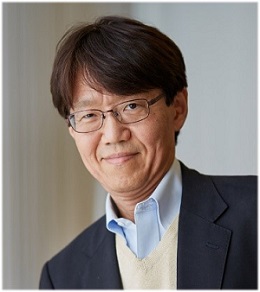Greetings from the director

Toru Takumi, M.D., Ph.D.
Department of Physiology and Cell Biology
Kobe University Graduate School of Medicine
Welcome to the Center for Cell Signaling and Medical Innovation!
Founded in 2016, the Center for Cell Signaling and Medical Innovation (CSMI) is a core facility as a part of the project to strengthen Kobe University’s function. FY 2021 is the final year of the project.
The COVID-19 pandemic, along with the worldwide shutdown and restrictions on our activities, has forced us to realize that so many of the things we counted on were simply not as sure as we have always believed them to be. Academia was no exception to this. We have still been swayed around by Covid-19, even after more than 70% of the population received the 2nd shot of the vaccine as of the end of October 2021.
The 2020 pandemic has dramatically changed life. It certainly accelerated the development of digital transformation in the global community. In its aftermath, the structure of CSMI is evolving: a new division, AI・Digital Healthcare/Medical Devices, was formed, inviting experts from the field of AI・Digital Health Science. Two new platforms were provided: one is for imaging study aiming for cross-disciplinary research centering our in-school imaging technology and the other is for advancing the studies on sensory systems, focusing on sensory disturbance in super-aged society and dysosmia in the new age we must cope with Covid-19.

Let me update the members of CSMI as of FY 2021;
Board
I, Toru Takumi, succeeded to the position of Head of CSMI from April 2021, according to Professor Yasuhiro Minami’s appointment as Dean of Kobe University Graduate School of Medicine. Professor Akira Suzuki, Division of Molecular and Cellular Biology, and Professor Ryo Nitta, Division of Structural Medicine and Anatomy, replaced the position of Vice Director of CSMI after Professor Ken-ichi Hirata, Division of Cardiovascular Medicine, who held the position from April 2019 until March 2021.
Research Units In April 2021, Professor Takehiko Ueyama, Molecular Pharmacology, Biosignal Research Center, joined the Unit of Brain and Mind, Professor Ken-ichi Nibu, Otolaryngology-Head and Neck Surgery, joined the Unit of Immunology・Inflammation. In September, Professor Yoshiaki Kido, a member of the Board of Kobe University, left the Unit of Metabolism. Furthermore, Associate Professor Masakazu Shinohara, the Integrated Center for Mass Spectrometry/Epidemiology, was nominated as his successor, Professor Akiharu Kubo, Division of Dermatology, and Professor Kandai Nozu, Division of Pediatrics, joined the Unit of Immunology and Inflammation.
Next, we are pleased to report the activities of CSMI in FY 2021. In April, we started the “CSMI Project to Support Collaborative Research of Young Researchers” to support early career scientists. We called for proposals for collaborative research projects among young scientists. The applications were evaluated on a competitive basis by the Advisory Board (the external Evaluation Committee) and the Principal Investigators at CSMI, and 3 research proposals were selected. The achievements of these 3 research projects will be presented in the Progress Report/Evaluation Meeting scheduled to be held sometime in the first half of FY 2022. In July, we held a virtual progress meeting for the research groups selected for the same project in FY 2020. The meeting concluded with great stimulation not only for the presenters but also for all participants, as they had a rare opportunity for valuable scientific discussion with the Advisory Board. After the presentation, we had Dr. Hitoshi Nakagama, Director of the National Cancer Center Japan, for his special lecture to talk about “Recent Progress in Basic Cancer Research and Cancer Genomics.” In September, a joint virtual symposium was conducted with the University of Washington in Seattle with twelve scientists (six from Kobe University and six from Washington University) for research exchange. In November, the PIs at CSMI reviewed the progress of three CSMI Project Assistant Professors to provide their comprehensive and insightful feedback. In December, Emergence Conference (workshop) was held to generate collaborative research projects among young scientists through technical information exchange.
The remarkable thing about this workshop 2021 was that we had participants from Kobe University Graduate School of Science and RIKEN Center for Biosystems Dynamics Research, which enhanced cooperation with other faculties in the university and research institutions outside of it. Associate Professor Kei Sato, The Institute of Medical Science, The University of Tokyo, joined us to lecture on “Evolution of Novel Coronavirus – its past and future” as the speaker of the keynote lecture this year. In February 2022, we held a retreat, called “Wakate Dojo” for young scientists. This series of the retreat is aimed at scientific stimulation for young scientists. It was supposed to be an in-person meeting, but, again, it was obliged to be virtual as Japan entered the 6th wave of Covid-19 infections. For this retreat, we invited Professor Yuji Iketani, The University of Tokyo Graduate School of Pharmacology, and Professor Fumiyo Ikeda, Medical Institute of Bioregulation, Kyushu University, as special speakers and guests for the meeting. From June, CSMI organized a monthly meetup, “Kusunoki Social” to invite the staff at any level at Kobe University Graduate School of Medicine to strengthen mutual ties so that we can all pull together for further development of our Graduate School of Medicine.
For CSMI, the fiscal year 2021 was the final year of the 3rd phase of the period for the mid-term goals/mid-term plan amid the time of challenge living together with Covid-19. Not only that, our activities were restricted in many ways. However, looking on the bright side, digital transformation is dramatically developing, which expanded the possibility of human communication. For example, it enables us to meet with noted scientists at home and abroad, whom we can seldom book for an invitation. That is, the Virtual meeting allows us more flexibility in meeting organization; it frees us from limits of the number of audience or venue, schedule, etc. Through CSMI’s persistent attempts to survive the Covid-19 crisis, I eagerly hope that the Graduate School of Medicine will accomplish further development.